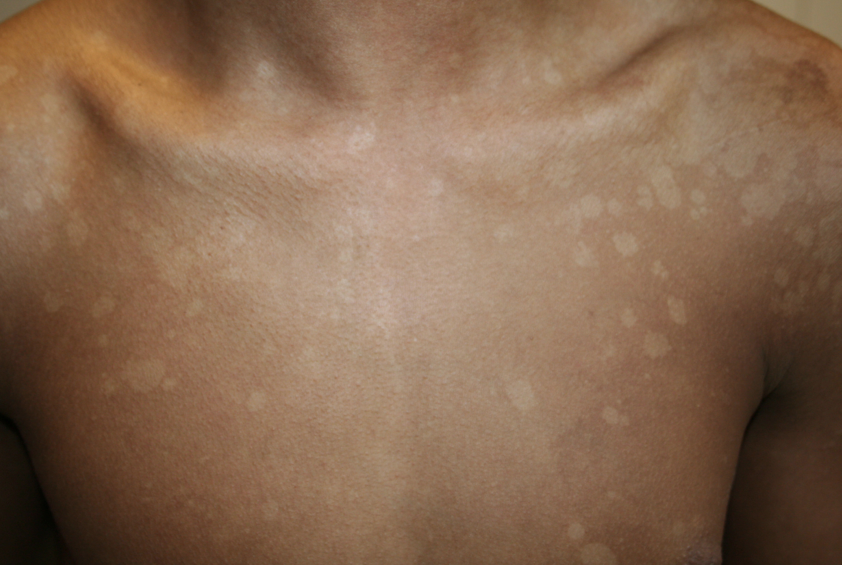Sunburned and Blotchy Skin Understanding and Managing Sun-Induced Skin Irritation

Have you ever experienced the unpleasant sensation of your skin turning red and blotchy after a day in the sun? This common reaction, often accompanied by discomfort and even pain, is a clear sign of sun damage. Understanding why this happens and how to manage it is crucial for protecting your skin's health.
Sun-induced skin irritation, often appearing as red, blotchy patches, is primarily caused by overexposure to ultraviolet (UV) radiation. This radiation damages the skin's cells, leading to inflammation and the characteristic redness. The blotchiness can be due to uneven melanin distribution or variations in blood flow to the affected areas. This reaction, commonly known as sunburn, can range from mild redness to severe blistering.
While the immediate concern with sun-induced skin irritation is the discomfort it causes, the long-term implications are far more serious. Repeated sunburns significantly increase the risk of developing skin cancer, including melanoma, the deadliest form. Protecting your skin from the sun's harmful rays is not just about comfort; it's about safeguarding your health.
The appearance of blotchy, irritated skin after sun exposure is a relatively recent phenomenon in human history, coinciding with increased leisure time spent outdoors and changing fashion trends that expose more skin to the sun. Before the 20th century, sun exposure was primarily associated with occupational activities, and protective clothing was commonplace. Today, awareness of the dangers of sun exposure is growing, leading to the development of sunscreens and other protective measures.
Understanding the underlying mechanisms of sun-induced skin irritation is key to effective management. UV radiation damages the DNA in skin cells, triggering an inflammatory response. This inflammation causes the blood vessels in the skin to dilate, resulting in redness and heat. The blotchiness can be attributed to variations in melanin production and blood flow. In severe cases, fluid can accumulate under the skin, forming blisters.
While red, blotchy skin after sun exposure doesn’t have inherent "benefits," recognizing it as a warning sign can be beneficial in preventing further damage. It alerts you to the fact that your skin has received excessive sun exposure and needs protection. This can lead to improved sun-safety habits.
If you experience sun-induced skin redness and blotchiness, there are several steps you can take to alleviate the discomfort. Cool compresses, aloe vera gel, and over-the-counter pain relievers can help soothe the skin. Avoid further sun exposure and keep the affected area moisturized. If the sunburn is severe, with blistering or fever, seek medical attention.
Advantages and Disadvantages of Recognizing Sun-Induced Skin Irritation
| Advantages | Disadvantages |
|---|---|
| Early detection of sun damage | Potential for anxiety about sun exposure |
| Promotes proactive sun protection | Can be mistaken for other skin conditions |
Avoiding sun-induced skin irritation is the best approach. Always apply a broad-spectrum sunscreen with an SPF of 30 or higher, even on cloudy days. Wear protective clothing, such as hats and long sleeves, and seek shade during peak sun hours.
Frequently Asked Questions:
1. What causes blotchy skin after sun exposure? Overexposure to UV radiation.
2. How can I treat sunburned skin? Cool compresses, aloe vera, and pain relievers.
3. How can I prevent sunburn? Sunscreen, protective clothing, and shade.
4. Is sun-induced skin irritation serious? Yes, it can increase the risk of skin cancer.
5. What does blotchy sunburn look like? Uneven patches of redness on the skin.
6. How long does blotchy sunburn last? Several days to a week, depending on severity.
7. Should I see a doctor for sun-induced skin irritation? If severe, with blistering or fever.
8. Can I still get sunburned on a cloudy day? Yes, UV radiation can penetrate clouds.
Tips and Tricks: Keep a bottle of aloe vera gel in the refrigerator for a cooling effect. Reapply sunscreen every two hours, especially after swimming or sweating.
In conclusion, red blotchy skin after sun exposure is a common yet serious issue. Understanding its causes, symptoms, and potential long-term consequences is essential for protecting your skin's health. By taking proactive steps to prevent sunburn and managing it effectively when it occurs, you can minimize your risk of skin cancer and maintain healthy, radiant skin. Recognizing the early signs of sun damage, like blotchy redness, allows for prompt action and encourages healthier sun-safety habits. While discomfort and potential anxiety can accompany sun-induced skin irritation, the advantages of early detection and proactive protection outweigh the disadvantages. Remember to always prioritize sun protection and consult a dermatologist if you have any concerns about your skin's health. Don't let a day in the sun lead to long-term skin problems. Protect yourself and enjoy the sun responsibly.
Elevating your home with benjamin moore exterior paint
Unlocking italian liqueur secrets 95 alcohol
Finding your perfect clewiston florida rental




:max_bytes(150000):strip_icc()/GettyImages-1215123284-150e22ec743345d9b2573897c548a35a.jpg)








